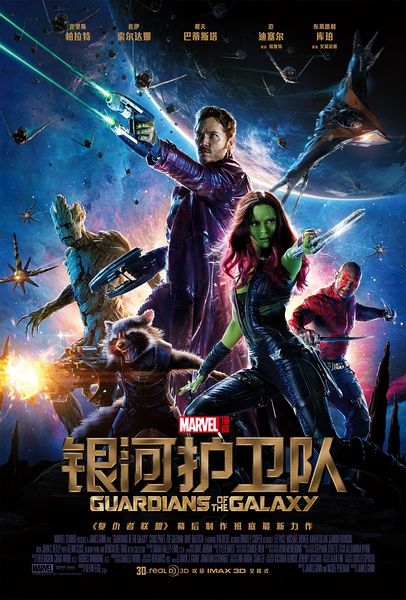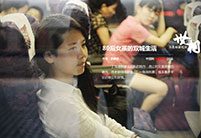 Lingerie show at 2014 Miss China
Lingerie show at 2014 Miss China
 Fan Bingbing's "Queen style" in new play
Fan Bingbing's "Queen style" in new play
 Top 10 pricey destinations for studying abroad
Top 10 pricey destinations for studying abroad
 Couple chase tornados to create perfect storm photos
Couple chase tornados to create perfect storm photos
 J-10 fighters show aerobatic stunts in smog-free sky
J-10 fighters show aerobatic stunts in smog-free sky
 Top 10 charming female soldiers of the PLA
Top 10 charming female soldiers of the PLA
 Charming contestants of Shanghai Int’l Model Contest
Charming contestants of Shanghai Int’l Model Contest
 Most amazing chi-pao beauties
Most amazing chi-pao beauties
 7 deadly animal attacks
7 deadly animal attacks
 Picturesque autumn scenery of Hongshan Army Horse Ranch
Picturesque autumn scenery of Hongshan Army Horse Ranch
 |
| Poster of Guardians of the Galaxy. (Photo/Xinhuanet) |
Since the release of the movie Guardians of the Galaxy in China, a heated discussion about the translation of the movie have spring up among its audience. There is a debate about how imported movies can achieve a satisfactory translation, and comment about how some background information on the characters has been lost in translation.
The debate on the translation of the movie has now gone viral. Many people have criticized the translator of the movie, Jia Xiuyan, suggesting that she has almost ruined the science fiction comedy. One micro-bloger has listed 80 mistakes Jia made in the translation. There is a slogan in the TV show Hero - "Save the cheerleader, save the world." Only in this case, it seems that people would like to change the slogan to "Expel the translator, save the Galaxy."
On the one hand, it is true that Jia Xiuyan's translation does have some shortcomings. For example, when Ronan says "My father and his father shall finally be revenged", this has been translated into Chinese as "My father and his father fermented this revenge". The movie has also lost some of its unique tones in the translation. When Ronan yells out "You call me boy!!!" for instance, the neutral Chinese translation completely loses the infuriated "how dare you" tone. In fact, this is not the first time that Jia Xiuyan has been widely criticized. The translations of Men in Black III and Pacific Ring were both her works, and just like the Guardians of the Galaxy, they elicited considerable criticism.
On the other hand, translating imported movies has never been an easy job. First of all, because of confidentiality agreements, translators often do not have access to the whole movie, but have to produce their translations based on the scripts, and under considerable time pressure. Secondly, in superhero movies like Guardians of the Galaxy, foreign names of characters, places, and other important elements might have been dictated by the parent film company, and the translator may not have any right to change them. Moreover, the Chinese subtitles of an English movie have to follow the dubbed Chinese, which places strict timing requirements on each sentence, and even individual words. Translating imported movies is not a free market; instead the work is assigned by the authorities. As a result, you cannot simply replace a translator who is not up to the job.
A movie containing a lot of American pop culture references, slang, and phonetic puns from the 1970s and 1980s, like Guardians of the Galaxy, is very difficult to translate. Few members of a Chinese audience would get the point of having a song like "Cherry Bomb" right before the decisive battle, and how this arrangement would be considered as enthusiastic and humorous at the same time. Is it not a little unreasonable to expect the translator to capture and represent every cultural feature of the background?
Translating imported movies can be a big issue. Expelling one translator will not save the Galaxy. To marketize the translation of imported movies and to find the most suitable translator for every movie would be a good start in remedying the problem.
This article is edited and translated from 《干掉一个坏翻译,拯救不了银河系》,Source: Beijing News
 Fast and Furious: Post-85s female pilots and their mission
Fast and Furious: Post-85s female pilots and their mission Century-old public bath closes door in Beijing
Century-old public bath closes door in Beijing A post-80s girl's tale of two cities
A post-80s girl's tale of two cities Shocking! Photos of Chinese fighters revealed
Shocking! Photos of Chinese fighters revealed World's most intimidating nuclear weapons
World's most intimidating nuclear weapons Standard faces for each countries in the world
Standard faces for each countries in the world Netizens fall in love with champion swimmer Ning Zetao
Netizens fall in love with champion swimmer Ning Zetao Vibrant 21-year-old and her own Cheongsam brand
Vibrant 21-year-old and her own Cheongsam brand Fashion style: Faye Wong vs Cecilia Cheung
Fashion style: Faye Wong vs Cecilia Cheung Top 10 most dangerous jobs in the world
Top 10 most dangerous jobs in the world  Top 10 fifth generation jet fighters in the world
Top 10 fifth generation jet fighters in the world Top 10 Chinese goddesses
Top 10 Chinese goddesses  Top 20 hottest women in the world in 2014
Top 20 hottest women in the world in 2014 Top 10 pure beauties in showbiz
Top 10 pure beauties in showbiz  Top 10 world's highest-paid models 2014
Top 10 world's highest-paid models 2014 The most gorgeous Chinese women
The most gorgeous Chinese women Top 10 most handsome faces in Asia
Top 10 most handsome faces in AsiaDay|Week|Month